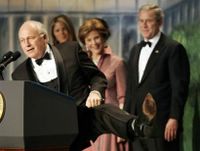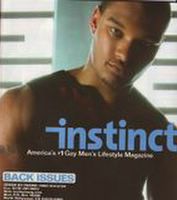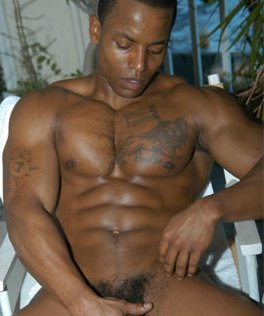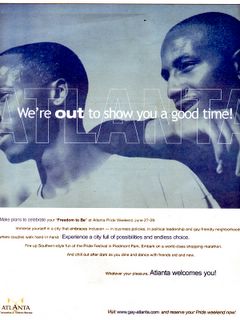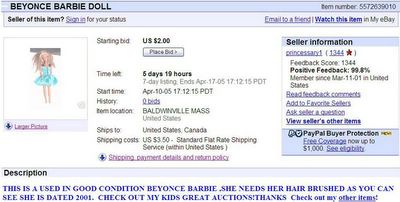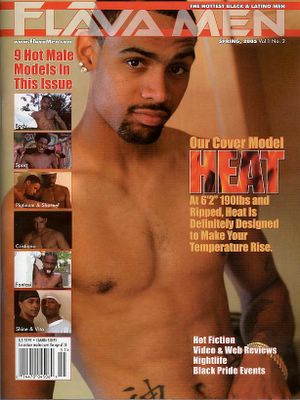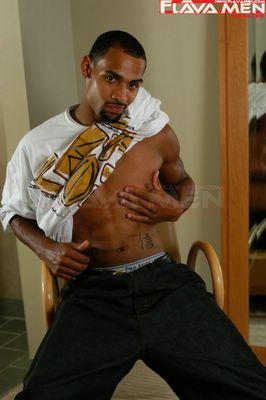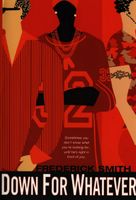 Down for WhateverBy Frederick Smith
Down for WhateverBy Frederick SmithKensington Books; July 2005
$14/$20
By now, you've probably realized that this is not a politically correct weblog. So get your slingshots ready ... aim ... and fire at this one: Much of GBM fiction is like that old Budweiser commercial,
Tastes great, less filling. Many of the plots are (a)
derivative, (b)
fantastic ... or often (c)
both.
A=Sistah-girls-waiting-to-exhale-with-their-fag-hag-friends.
B=Millionaires, billionaires and moguls on the DL.
C=Unlikeable, celibate and prissy queens who are swept off their feet by men like this.Frederick Smith's debut novel refreshingly
avoids these cliches, and sets a new agenda.
Down for Whatever is intensely enjoyable, a humorous, revealing story that follows four Angelenos in a town "where everyone is a ten, looking for a twelve." Each chapter is written from an alternating point of view, and the varied descriptions of the same events is often hilarious. Two of the friends are black, the other two are Latin, and the work is peppered with
spanglish and
sabor latino. The novel provides a much-needed glimpse into the sexual and racial politics within the LA's gay community. [Download first chapter at
Fred's site]
Of the four buddies,
Keith is the most accomplished, wealthiest and loneliest. The Stanford grad and Michigan transplant is frustrated that he "can't even get a black man to look his way." Roommate
Tommie is a former R&B star who is down on his luck and on the down-low. Keith's best friend
Marco Antonio is a social worker torn between his assimilationist yet traditional family, and a hot soap actor who could charm his way into Fort Knox. Then there's
Rafael. Young and gorgeous in a town where "everybody loves Latinos." Retail queen-slash-
go-go-boy-slash-serial heartbreaker who is trouble with a capital "T." Exactly my type!
"Everybody loves Latinos" is an omnipresent theme in
Down, because it's the cultural norm in California.
Keith embraces multiculturalism, at times to his detriment. He's frustrated that his value as a black man is discounted because:
No matter what people say, race matters in LA. In the ethnic hierarchy of gay LA, black and African American often finishes last.
Those are Keith's words, and as a black man it's easy to identify with his frustration. NYC gay politics are strikingly similar, except for stronger identification between black and brown. Most of the east coast brothas are not trying to compete with Anglos or Latinos for men, we've constructed our arena.
Whereas the east coast flava embraces black and African culture and celebrates black masculinity, LA does not.
Fred Smith's observations on SoCal culture are Stinger missiles: basic black does not go with everything, unless you are mixed, thugged out, body beautiful or a snow queen.
Keith's character is none of these. It's hard for me not to like him, there's so much of myself there: the exhiliration yet isolation experienced at a prestigious university, the cross-country journey and re-invention, the dismay and fascination with the social landscape. He's a bourgeois, well-monied type (unlike me) that sometimes feels above others. Other times, his insecurities drive him to the opposite. At times he seems more partial to
vatos and
chulos than blacks, spending much of the book chasing after playa Cesar. Yet Keith yearns to partner with another brotha, and after ten years still carries the torch for a brotha he loved in college. But should he have to choose between black and brown? Does it matter?
Roommate
Tommie feels that it does. "Keith's little crew is all Mexican," he says. "They always trying to get me to go to they little gay-ass salsa clubs." Tommie is a former R&B heartthrob whose career and bank account have seen better days. The silver-lining is his relationship with Tyrell, a UCLA hoops phenom. Both are deep DL, even though youngster Tyrell appears more confident about his sexuality. It's an interesting relationship; Tommie's intentions are good, but he can be triffling. He is unsure and unworthy of the affections of the young baller ten years his junior. Tommie loves Tyrell, yet is resentful of his success, a hip-hop
A Star is Born. Their relationship is tested when Tommie hooks with Rafael, whom none can resist.
Mexicans only hook up with other Mexicans. It's one of those things we know but don't talk about. Anyone's fair game to me.
Rafael's whose motto is: "Sex with gorgeous people, wherever I want, whenever I want." That he does: in clubs, with married men, high school boys working at 7-11 ... why was his character so irresistible? Even when causing havoc—like losing his job or sleeping with Keith's Cesar—he does it with such panache that you secretly cheer him. Maybe because his character is the liveliest; possibly because we admire his scrappy spirit. Ultimately Rafael's self-destructive behavior almost destroys the bond among the four men, and endangers all.
Marco Antonio is the odd-man out. His character is not as conflicted as Keith or Tommie, nor does he have Rafael's chutzpah. He and Keith met at Stanford, and are both of the intelligentsia. Marco Antonio's family is assimilationist—"How many people of Mexican descent name their kids Chloe or Ross?"—and begrudgingly accepts his sexuality. But the family is far from liberal; a relative even makes a racial comment about blacks. They seem more impressed with him dating Alex, the
novela star who later gets a job on an American soap ... and promptly dumps Marco Antonio. Or did he?
There's something here for everyone, and that's what makes
Down for Whatever so enjoyable.
Fred Smith is an LA writer and educator, possibly the first GBM writer published by
Kensington, which has carved a niche in gay fiction. The author is equally adept discussing the lingo and customs of
la familia or the down low. Fred's work is taut, engaging and more importantly, that most-precious commodity:
clever. The characters are rich and lively, flawed yet sympathetic and passionately realistic.
Down for Whatever is a delicious, all-you-can-eat brunch. Enjoy.

